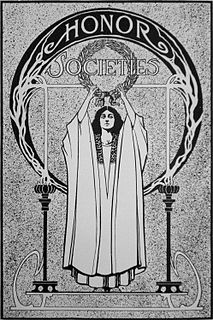Related Research Articles
Sigma Alpha (ΣΑ) is a professional agricultural sorority.

In the United States, an honor society is a rank organization that recognizes excellence among peers. Numerous societies recognize various fields and circumstances. The Order of the Arrow, for example, is the National Honor Society of the Boy Scouts of America. Chiefly, the term refers to scholastic honor societies, those that recognize students who excel academically or as leaders among their peers, often within a specific academic discipline.

Southern Arkansas University (SAU) is a public university in Magnolia, Arkansas.

Sigma Alpha Iota (ΣΑΙ) is an International Music Fraternity. Formed to "uphold the highest standards of music" and "to further the development of music in America and throughout the world", it continues to provide musical and educational resources to its members and the general public. Sigma Alpha Iota operates its own national philanthropy, Sigma Alpha Iota Philanthropies, Inc. Sigma Alpha Iota is a member of the National Interfraternity Music Council and the Professional Fraternity Association.

Omicron Delta Kappa (ΟΔΚ), also known as The Circle and ODK, is one of the most prestigious honor societies in the United States with chapters at more than 300 college campuses. It was founded December 3, 1914, at Washington and Lee University in Lexington, Virginia, by 15 student and faculty leaders. The society recognizes achievement in five areas: scholarship; athletics; campus and community service, social or religious activities, and campus government; journalism, speech and the mass media; and creative and performing arts. Some circles of ΟΔΚ are quasi-secret, in that newly selected members remain undisclosed for some time.

Sigma Lambda Upsilon (ΣΛΥ) or Señoritas Latinas Unidas Sorority, Inc. is a Latina-based sorority founded on December 1, 1987 at Binghamton University.
William Harry Vaughan, Jr. was a professor of ceramic engineering at the Georgia School of Technology and the founder and first director of what is now the Georgia Tech Research Institute.
Carolyn Winstead Meyers is the former president of Jackson State University. Meyers, a native of Newport News, Virginia, earned a bachelor's degree in mechanical engineering from Howard University. She earned a master's degree in mechanical engineering from the Georgia Tech in 1979, and a doctorate in chemical engineering from Georgia Tech in 1984. She completed post doctoral work at Harvard University.
Harold Alan Bunger was the head of Georgia Tech's chemistry department and the director of the Georgia Tech Research Institute from 1940 until his death in 1941.

William Vernon Skiles was a professor of mathematics and dean at the Georgia Institute of Technology. He helped create what is now the Georgia Tech Research Institute.

James Emory "Jim" Boyd was an American physicist, mathematician, and academic administrator. He was director of the Georgia Tech Research Institute from 1957 to 1961, president of West Georgia College from 1961 to 1971, and acting president of the Georgia Institute of Technology from 1971 to 1972.

Delta Epsilon Psi (ΔΕΨ) is a South Asian interest social and service fraternity located in the United States. Delta Epsilon Psi Fraternity, Inc. was founded on October 1, 1998 at the University of Texas at Austin. The 18 founders formed the fraternity to provide a unified South Asian voice at the school.

Kappa Omicron Nu (ΚΟΝ) is a college honor society, based in the United States, for students in human sciences. Kappa Omicron Nu chapters are located at colleges and universities that offer a strong human sciences program. It's mission is to promote empowered leaders through excellence in scholarship, leadership, and research in the human sciences. There is also a strong focus on service, and contribution to the local community.

The Phi Epsilon Pi (ΦΕΠ) fraternity, active between 1904 and 1970 with a predominantly Jewish membership, was founded in New York City and eventually opened at least 48 chapters on college campuses across the United States and one in Canada. After several mergers it consolidated into Zeta Beta Tau in 1970.

Phi Epsilon Kappa (ΦΕΚ) is a national professional fraternity for persons engaged in or pursuing careers in the fields of physical education, health, recreation, dance, human performance, exercise science, sports medicine and sports management.
References
- ↑ "Independence County, AR-Campground Cemetery". USGenWeb Archives. Archived from the original on 2010-05-03. Retrieved 2010-02-02.
- 1 2 "History Makers". Georgia Tech Research Institute. Archived from the original on 2010-06-16. Retrieved 2010-01-27.
- ↑ "Audio Tape or Compact Disk Interviews". Old Independence Regional Museum. Archived from the original on 2009-01-05. Retrieved 2010-02-02.
- ↑ Calaway, Paul (May 1933). "A study of the preparation of thiolbenzoic acid by new methods". Georgia Institute of Technology . Retrieved 2010-02-02.
- 1 2 "Dr. Paul K. Calaway Awarded '47 Sigma Xi Research Prize". The Technique . 1947-04-19. Retrieved 2010-02-02.
- ↑ "Fort Worth Star-Telegram Collection". University of Texas at Arlington Library. Archived from the original on 2010-06-21. Retrieved 2010-02-02.
- ↑ "Dr. Calaway To Teach Again Powder Course". The Technique . 1941-11-21. Retrieved 2010-02-02.
- ↑ "Defense Course In Explosives Again Offered". The Technique . 1942-03-04. Retrieved 2010-02-02.
- ↑ "Dr. Calaway Speaks To Alpha Chi Sigma On Topic, 'Explosives'". The Technique . 1947-03-08. Retrieved 2010-02-02.
- ↑ "Graduate Chemist Develops Three New Quinoline Drugs". The Technique . 1942-02-20. Retrieved 2010-02-02.
- ↑ "A study of quinoline compounds". Georgia Institute of Technology. May 1942. Retrieved 2010-02-02.
- ↑ "Dr. Calaway Is Awarded Sigma Xi Research Prize". The Technique . 1947-06-28. Retrieved 2010-02-02.
- ↑ "Membership by Tapping Class". Georgia Tech Omicron Delta Kappa. Archived from the original on 2008-12-03. Retrieved 2010-02-02.
- ↑ Martin, Harold H. (1987). Atlanta and environs: a chronicle of its people and events. Atlanta Historical Society. pp. 208–209. ISBN 978-0-8203-0913-2 . Retrieved 2010-02-02.